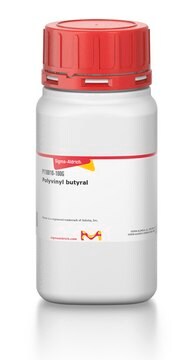308501
Benzyl butyl phthalate
98%
Synonym(s):
Butyl Benzyl Pthalate
About This Item
Recommended Products
vapor density
10.8 (vs air)
Quality Level
vapor pressure
0.16 mmHg ( 150 °C)
Assay
98%
form
viscous liquid
autoignition temp.
450 °F
refractive index
n20/D 1.54 (lit.)
density
1.1 g/mL at 25 °C (lit.)
SMILES string
CCCCOC(=O)c1ccccc1C(=O)OCc2ccccc2
InChI
1S/C19H20O4/c1-2-3-13-22-18(20)16-11-7-8-12-17(16)19(21)23-14-15-9-5-4-6-10-15/h4-12H,2-3,13-14H2,1H3
InChI key
IRIAEXORFWYRCZ-UHFFFAOYSA-N
Gene Information
mouse ... Esr1(13982)
Looking for similar products? Visit Product Comparison Guide
Related Categories
Application
- Use as Plasticizer: BBP was predominantly used as a plasticizer in PVC to increase flexibility. Its application extended to products such as artificial leather, flooring, and adhesives (Wikiwand).
Signal Word
Danger
Hazard Statements
Precautionary Statements
Hazard Classifications
Aquatic Acute 1 - Aquatic Chronic 1 - Repr. 1B
Storage Class Code
6.1C - Combustible acute toxic Cat.3 / toxic compounds or compounds which causing chronic effects
WGK
WGK 3
Flash Point(F)
235.4 °F - closed cup
Flash Point(C)
113.0 °C - closed cup
Personal Protective Equipment
Regulatory Listings
Regulatory Listings are mainly provided for chemical products. Only limited information can be provided here for non-chemical products. No entry means none of the components are listed. It is the user’s obligation to ensure the safe and legal use of the product.
EU REACH SVHC Candidate List
EU REACH Annex XVII (Restriction List)
EU REACH Annex XIV (Authorisation List)
Choose from one of the most recent versions:
Already Own This Product?
Find documentation for the products that you have recently purchased in the Document Library.
Customers Also Viewed
Our team of scientists has experience in all areas of research including Life Science, Material Science, Chemical Synthesis, Chromatography, Analytical and many others.
Contact Technical Service












